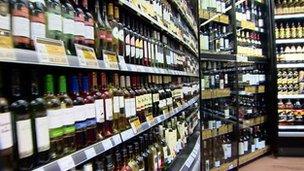Canadian study 'backs minimum alcohol price benefits'
- Published

The policy is aimed at reducing consumption among those at greatest risk of harm from drinking
Supporters of minimum pricing for alcohol claim new research from Canada provides further evidence that it would reduce consumption in Scotland.
The Saskatchewan province introduced the policy in 2010 and a study found a 10% hike in alcohol prices reduced consumption by 8% overall.
The biggest drop was in high-strength beer sales, which were down 22%.
Alcohol Focus Scotland said the policy reduced consumption among those who are at greatest risk of harm from drinking.
The Scottish government goes to court next week to defend the introduction of a minimum alcohol price after the Scotch Whisky Association petitioned to have the policy overturned.
Meanwhile, the Canadian research has been published in the American Journal of Public Health, external.
Prof Tim Stockwell, lead author of the study, said: "As cheaper alcohol is preferred by young and heavier drinkers, both of whom are more liable to experience alcohol-related harms, price increases that target the cheapest, strongest alcohol products are likely to have significant public health benefits.
"Saskatchewan's approach to minimum alcohol pricing is very similar to what Scotland is planning. We found their approach to have more than double the impact of a less comprehensive approach used in British Columbia, where minimum prices were not linked to alcohol content."
Key findings of the Canadian research suggested:
• A 10% increase in the minimum prices reduced total consumption by 8%
• Bigger increases in minimum prices for stronger drinks resulted in proportionately bigger reductions in consumption of those products
• A 10% increase in the minimum price of beer was associated with a 22% decrease in consumption of higher strength beer compared with an 8% reduction in lower strength beers
• An increase in the price of the cheapest, strongest alcohol was accompanied by a shift in consumer preferences towards lower alcohol content beer, wine and cocktails.
Dr Evelyn Gillan, chief executive of Alcohol Focus Scotland, said it provided more evidence that minimum pricing works.
"It shows the real potential of minimum pricing to reduce the consumption of those who are at the greatest risk of harm from their drinking," she added.
"Implementing minimum pricing to tackle high levels of alcohol harm should therefore be considered a crucial policy measure as the evidence shows that it can deliver additional health benefits that cannot be achieved in other ways.
"The global alcohol producers are following in the footsteps of their friends in the tobacco industry by seeking to delay this vital legislation that has the potential to save lives in Scotland."
- Published1 October 2012
- Published28 September 2012
- Published19 July 2012